The Dallas Cowboys will head to Santa Clara to take on the San Francisco 49ers on Sunday Night Football this week. It’s billed as the best game on the NFL Week 5 schedule with both teams looking like legitimate Super Bowl contenders.
The backdrop here is Dallas losing to San Francisco in the playoffs each of the past two seasons. Don’t think this isn’t lost on head coach Mike McCarthy and Co.
“You live to play in these kinds of games. You dream about these kinds of games. You don’t want to make it bigger than it is, but the reality is it’s not just another game,” McCarthy on taking on San Francisco in Week 5.
For those a little longer in the tooth, this is the continuation of a rivalry that, at times, defined the NFL stage for the past half-century or so.
From Dallas’ epic comeback inside the old Candlestick Park back in December of 1972 to the young San Francisco 49ers making their presence known roughly a decade later in an NFC Championship Game defined by “The Catch,” there have been some remarkable games in this long-time rivalry. That doesn’t even take into account epic clashes in the NFC Playoffs between the two in the 1990s.
We thought it would be fun to look at the five-best games between the Dallas Cowboys and San Francisco 49ers ahead of what promises to be a hotly-contested affair Sunday night.
Related: San Francisco 49ers, Dallas Cowboys standing in Sportsnaut’s NFL power rankings
5. Dallas Cowboys’ comeback at Candlestick
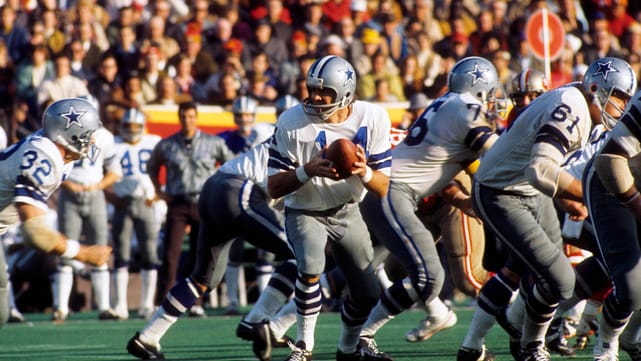
The year was 1972. Craig Morton was Dallas’ QB1 after Rogerr Staubach led the team to a 10-0 record and the Super Bowl title the previous season. Staubach found himself riding a pine as the Cowboys posted a 10-4 regular-season record.
On the other side, San Francisco had lost to Dallas in the NFC Championship Game the previous two seasons. Hosting Tom Landry’s squad at Candlestick Park in the divisional round, the hope was that Dick Nolan’s squad could finally come out on top.
For a while, it was looking this way. San Francisco opened up a 28-13 lead after three quarters following a Larry Schreiber touchdown run. That’s when the Cowboys turned to Staubach to replace Morton under center. He ended up leading the Cowboys to 17 points in the fourth quarter, including touchdown passes to Billy Parks and Ron Sellers to complete the comeback and win 30-28.
While Dallas lost to Washington in the conference title game, the rest was pretty much history for these two organizations over the next decade or so. Staubach became the Cowboys’ full-time starter, winning the Super Bowl following the 1977 season. As for San Francisco, it went through three different head coaches without making the playoffs over the next five seasons before a guy by the name of Bill Walsh arrived in Northern California.
Related: Dallas Cowboys standing in Sportsnaut’s NFL offense rankings
4. San Francisco 49ers NFC Wild Card win in January of 2022
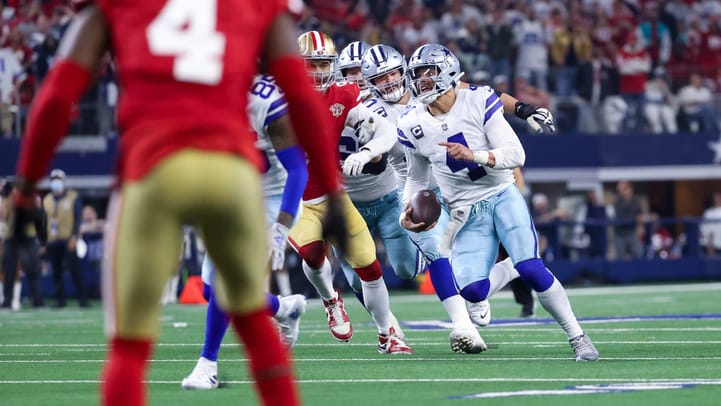
This represented the 49ers and Cowboys first postseason matchup since San Francisco won the NFC Championship Game in January of 1995 en route to earning its last Super Bowl title. It was also the seventh playoff game between the two rivals in their existence.
San Francisco barely inched into the playoffs with a 10-7 record via a Week 18 win over the Los Angeles Rams. On the other hand, the Cowboys had posted a 12-5 mark and earned home-field advantage in the wild card round.
Things did not start out swimmingly for the home team as San Francisco took a 13-0 lead about midway through the second quarter. The 49ers then found themselves up 23-7 after Jimmy Garoppolo hit Deebo Samuel on a 26-yard touchdown with 5:50 remaining in the third quarter.
You could hear grunts from Cowboys fans inside an AT&T Stadium that also saw a surprising number of 49ers fans. That’s when Dallas got going big time. A Greg Zuerlein field goal made it 23-10 early in the fourth as San Francisco’s offense sputtered. When Dak Prescott hit paydirt on a five-yard run midway through the fourth quarter, we had ourselves a game.
Unfortunately for the ‘Boys, a lack of execution on the part of Prescott and their offense led to more playoff futility. Dallas took over from its own 20-yard line with just 32 seconds left. With San Francisco surprisingly going to prevent defense, Prescott completed three consecutive passes to get it to the 49ers 41-yard line. With 14 seconds remaining, Prescott shockingly ran up the middle for 14 yards before attempting to spike the ball with no timeouts remaining. The clock ran out and led to a drama-filled 49ers win.
“I made the call knowing that we’re going to get some yards and get down, and I’ve got to clock it. Knowing that situation, something we’ve practiced over and over again,” Dak Prescott explained after the loss. “Ran, went and got some yards, went down, as I was getting behind Tyler saw four seconds left, thought it was time to make sure everybody was set.”
3. San Francisco 49ers take advantage of Dallas Cowboys mistakes in 1995
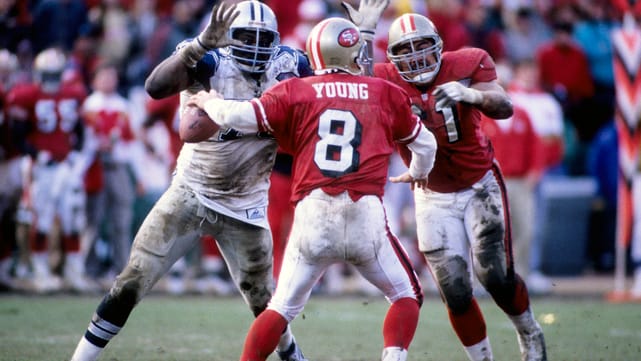
The 1994 NFC Championship Game between San Francisco and Dallas was a clash of the titans. Led by Troy Aikman, Emmitt Smith and Michael Irvin, the ‘Boys finished with a 12-4 record and as the second-best scoring offense in the NFL (25.9 PPG). They also boasted the third-best scoring defense (15.5 PPG) and a 10.4 PPG margin.
As for the 49ers, they spent the previous offseason adding stars such as Deion Sanders, Ken Norton Jr., Richard Dent and Gary Plummer to their defense in an attempt to overcome consecutive losses to Dallas in the NFC Championship Game. On offense, the likes of future Hall of Famers Steve Young and Jerry Rice spearheaded a unit that ranked first in scoring at 31.6 PPG. The 49ers also had a top-six scoring defense.
No one would have expected the game at Candlestick to start the way it did. Thanks to three Dallas Cowboys turnovers in the first seven minutes of the game, the 49ers took a 21-0 lead at the 7:27 mark of the first quarter. People watching from home couldn’t even finish their first beer or glass of wine before this got out of control. Cowboys fans probably turned to the harder stuff early.
Interestingly enough, Dallas did make this somewhat of a fame. Once Smith scored from one-yard out early in the third quarter, it was a mere 31-21 difference. However, a Steve Young three-yard touchdown run put this one on ice.
Young took the proverbial monkey off his back by leading San Francisco to his first Super Bowl after watching Montana win four. They would ultimately go on to destroy the then-San Diego Chargers in Super Bowl XXIX, 49-26, with Young tossing a record six touchdown passes en route to winning the game’s MVP award.
2. Dallas Cowboys ruin 49ers parade in final game ever played at Kezar Stadium
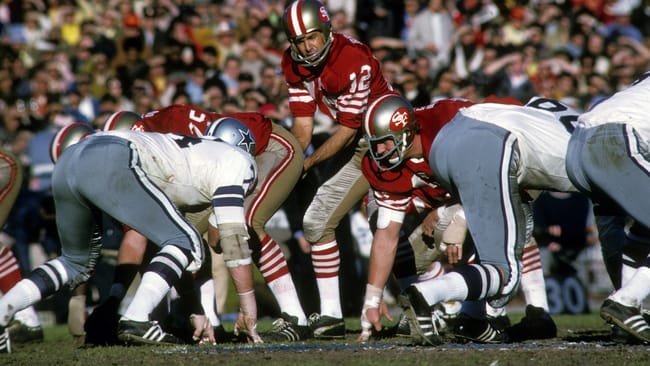
The home of the 49ers since their inception back in 1946, this NFC divisional playoff game following the 1971 season would end up being the last played at Kezar Stadium. San Francisco was erecting Candlestick Park further south and was ready to move into that stadium the following season.
San Francisco finished with a 9-5 regular-season record despite John Brodie throwing 18 touchdowns compared to 24 interceptions. In his 12th season as the Dallas’ head coach, Tom Landry was finally looking to get over the hump. It had lost to the Baltimore Colts in Super Bowl V the previous season and was seen as a better team than its counterpart after posting an 11-3 record.
This one went pretty much according to plan with Dallas holding San Francisco to nine first downs and just three points. But it was still a game into the fourth quarter until Duane Thomas scored from two yards out to give the Cowboys a 14-3 win. More than anything, this is notable in the Cowboys-49ers rivalry in that Dallas ended San Francisco’s run inside the historic Kezar Stadium.
Related: San Francisco 49ers standing in Sportsnaut’s NFL defense rankings
1. Dwight Clark wins it for the San Francisco 49ers in NFC Championship Game
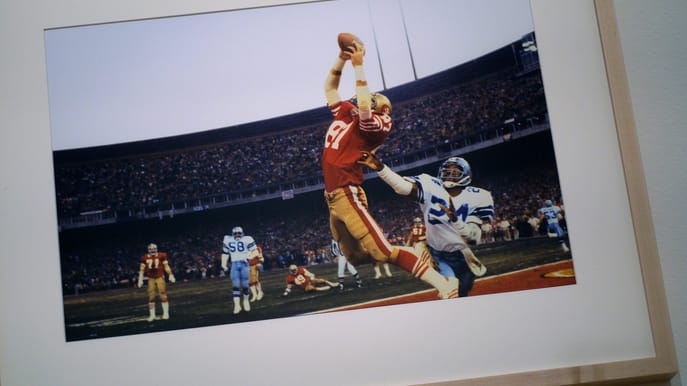
Football lore. We all pretty much know how the 1981 NFC Championship Game between the San Francisco 49ers and Dallas Cowboys ended. But there was a major backstory heading in and coming out of this game.
Tom Landry’s squad had been to three NFC Championship Game, a Super Bowl appearance and hoisted a Lombardi over the previous four seasons. San Francisco had posted a 10-34 record over the previous three seasons with young head coach Bill Walsh and quarterback Joe Montana looking to turn this thing around.
It was back in October of the regular season that San Francisco made its name known on the broader NFL stage with a 45-14 thrashing of the Cowboys at Candlestick. But things were going to be much different here. The latter stages of a dynasty taking on the upstart 49ers, who would end becoming the Team of the 80s.
Dallas led 27-21 after a Danny White touchdown pass to Doug Cosbie with just under five minutes left. San Francisco started from its own 11-yard line and had to go down the field against the vaunted Cowboys defense. Montana ended up completing 4-of-5 passes to open the drive with a Cowboys off-side penalty giving San Francisco a fresh set of downs.
Facing third down from the Cowboys’ six-yard line and a minute left in the game, San Francisco could still get a first down at the two. Rather, Montana dropped back to pass the ball. He faced pressure running to the right sideline before seemingly throwing the ball away and setting up a fourth down. That’s when Dwight Clark leaped in the air to catch the ball and tie the game. It’s a play now known as “The Catch.”
What people don’t realize about this game is the fact that White led the Cowboys to within 10-15 yards of field goal range before a strip-sack from Lawrence Pillers ended things.
As that Sunday turned to darkness, a dynasty was born in Northern California. The 49ers would go on to win four Super Bowls with Montana leading the charge. As for the Cowboys, they wouldn’t make it to the big game for another decade. The Landry era soon ended with Jerry Jones taking over as owner later in the decade.